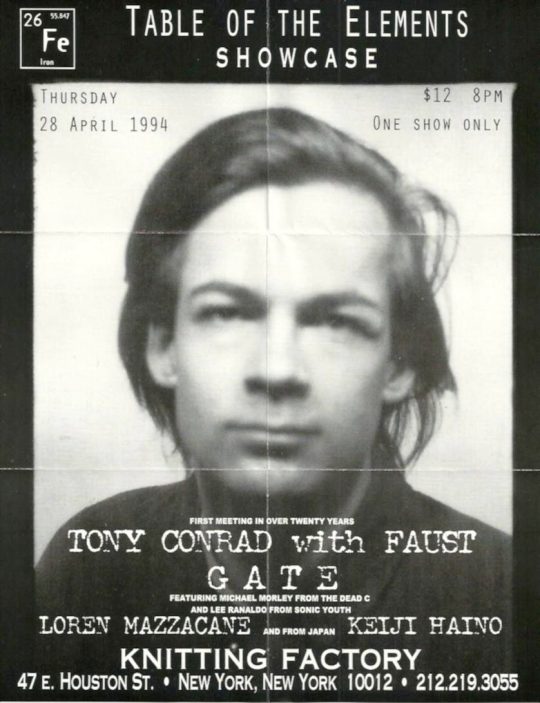#Faust with Tony Conrad
Explore tagged Tumblr posts
Text
Faust (1971), So Far (1972), Outside the Dream Syndicate (1973), The Faust Tapes (1973), Faust IV (1973), Faust





Even now, clearly the dawn of something entirely new; how terrifying, how exhilarating; rural weirdos tricked their way into far too much money, fooled the execs though to the rest of the planet those stupid execs are worth some thanks; not music to overthink, to do Faust right is to submit to it – with the help of certain substances or not – to indulge as they indulged and embrace an undefined, imaginative world.
Faust, the debut, strange, engrossing, perhaps not actually enjoyable. Sinister and playful, exceptionally loose in conventional structure (lacking the anchoring percussion of other krautrock instigators). The real genius, so I’ve heard, lies in the guys who actually managed to record it. Producer Uwe Nettelbeck for putting it together and Kurt Graupner, with his magical black boxes, for getting it onto record. Praise be to those little black boxes.
Second So Far is much more conventional, though that’s all relative, on a scale, a spectrum. Here are some conventional songs – or some tunes, at least, within tracks – switching between the folky and funky and faint and weird, with, of course, a fair measure of totally oblique things. Comes together much better than I.
And then a big year, 1973, three releases, all of which prised Faustworld even further open. With Tony Conrad on Outside the Dream Syndicate, the troupe started to resemble a kraut I know and love, yet were also so far from that, the metronome not tight apache but ritualistic march. Suits a narrative, too, the band emerging from its mad, fun cave with a stern, cold desire to dictate.
The Tapes were both a marketing gimmick and an archive in real time, peeling back the mysteries of Faust’s bafflingly obtuse musical fruit with liminal spectres of rock, folk, pop, jazz and orchestral music and high theory. Winking and nudging and epic, the Tapes showed theory and praxis though never – not really – demystified. Faust’s fruit is one of many skins, and those skins are so enticing to journey through that the juicy centre seems wholly unimportant.
IV listens as most academic, the Faust record refined and pored over by the gruppe and feasibly built as if to be studied – in process, making one second-guess the urge not to examine the band’s earlier pieces. But is that studying also a mistake? Such is the dialectical genius of Faust, to and fro, one thing and another, the unsurety of meanings or intentions – but the total sureness of one crucial thing: brilliance.
I can’t and won’t try to sum it all up, my brain is far too small – as are all brains, for that matter. The Faust phenomenon (or the era of the project most care about) happened in just a couple of years, yet entirely transformed music forever. Half a century later, the Faust story continues to carry further promise: that maybe someday someone else will do something so revolutionary, too.
Pick(s): ‘Meadow Meal’, ‘It’s a Rainy Day Sunshine Girl’, ‘The Side of Man and Womankind’, ‘Flashback Caruso’, ‘Krautrock’
#Faust#self-titled#So Far#Outside the Dream Syndicate#The Faust Tapes#Faust IV#Faust with Tony Conrad#krautrock#experimental rock#rock#experimental#musique concrète#tape music#sound collage#field recordings#psychedelia#psychedelic rock#drone#1971#1972#1973#music#review#music review
2 notes
·
View notes
Audio
outside the dream syndicate (1973)
7 notes
·
View notes
Text
06.19.23 Faust played at Le Poisson Rouge. This piece was dedicated to the great Tony Conrad
10 notes
·
View notes
Text

#tony conrad#faust#faust band#loren mazzacane#keiji haino#progressive rock#experimental music#frippost
2 notes
·
View notes
Text
Outside The Dream Syndicate - Tony Conrad & Faust
Tony Conrad was a member of the drone group named the Dream Syndicate(also called the Theatre of Eternal Music) of which there is only one officially released track from the era when Tony Conrad was in, 17 XII 63 NYC The Fire Is A Mirror (Excerpt) from the Todd Haynes Velvet Underground documentary soundtrack. This album is a collaborative drone album between Faust and Tony Conrad with two tracks. This is definitely something I would recommend for those interested in drone music, people who like the Velvet Underground song Venus in Furs, and those that enjoy krautrock. My favorite song is The Side of Man and Womankind.
Apple Music:
Spotify:
For those curious about why only one track of early Dream Syndicate music is released, there are authorship credit disputes about the compositions and this is an interesting link about it. Also, imo, La Monte Young can pound sand for his behavior.
#music#daily album recs#album recommendations#dailyalbumrecs#music recommendations#music recommendation#album recommendation#music rec#album recs#album rec#Drone music#Drone#Faust#Tony Conrad#Outside the dream syndicate
0 notes
Text
youtube
tony conrad with faust -- the side of man and womankind
1 note
·
View note
Text
Tony Conrad With Faust – Outside The Dream Syndicate(1973)

考えがうかばない、しかし私などは考えはいらない何故なら偶像視する先には絶望があるのが分かりきっているからです。だから逃避の道を探しては歩むのです。そして本作では時間を代償に間断なき音の交わり、上限も下限もない保つテンポは根元の更新と良心までをも含む精神の葛藤の趣、明確な特攻に姿勢を正すしかないのです。行進的クラッシュのダンス、もうすぐ夜です、出発します。
youtube
2 notes
·
View notes
Text
terry riley in c and faust/tony conrad outside the dream syndicate are both great albums for sure but its also funny cause like a lot of the reason they get talked abt or treated as v important documents is that theyre kinda the only officially released la monte young type drone music records since la monte young never released any of his stuff in his heyday so like i think ppl also just like them more cause of it being the closest theyll hear to la monte youngs early stuff lol.
#i def love outside the dream syndicate more than in c id say#just a lot more musically interesting having a 'rock' backing band is cool the way they flow along so well w/ it
2 notes
·
View notes
Text
Water Damage: The Sonic Violence of Minimalism

Exploring the Powerful Drone Compositions of Austin Band Water Damage
Austin band Water Damage has taken the droning minimalism of La Monte Young and Marian Zazeela and transformed it into a unique form of violence. Their music is a battle between the band and their instruments, between the sounds being wrestled out of those instruments and the listener. With their defining features of noise and repetition, Water Damage delivers a sonic assault that is reminiscent of being mugged at a music and light installation.
It's a raw and exhilarating experience that truly rocks.
youtube
Water Damage's Sonic Assault
Water Damage comprises around 10 musicians who come together to create a heady drone. They turn up the amps until the sound reaches a deafening roar, each musician trying to overpower the others over the course of an entire reel. Multiple drums and basses, fuzzed-out organ and bowed guitar, and a shrieking violin or viola all contribute to the cacophony, exploring the possibilities of creating one thing very loudly.
It takes immense restraint to play the same thing for such a long duration, but Water Damage manages to do so while fully unleashing themselves upon their instruments.
A Unique Approach to Minimalism
Water Damage follows in the footsteps of gonzo rock bands that have played the music of or alongside minimalist composers like Terry Riley, Tony Conrad, and Steve Reich. However, unlike bands such as Faust and Acid Mother's Temple, Water Damage focuses solely on their own original drone compositions. While comparisons to Faust or Acid Mother's Temple may not be entirely off-base, it's important to note that Water Damage is not dabbling in this style of music as an occasional experiment.
Their purpose is to powerfully contemplate a single note or chord for extended periods of time, a goal that is as noble as it is unique. Their latest double album set, "In E," features four pieces, including the mesmerizing "Reel E," which will be released on 12XU on April 12.
Water Damage's music is a force to be reckoned with. Their ability to create a relentless sonic assault while maintaining a sense of restraint is truly impressive. By focusing solely on their own original drone compositions, they have carved out a distinct space within the realm of minimalist music.
With "In E" set to be released soon, listeners can expect to be captivated by the powerful contemplation of a single note or chord that Water Damage offers. Brace yourself for a sonic journey like no other.
0 notes
Text
Tony Conrad and Faust teamed up in 1972 to make an album of minimalist, experimental music that still pushes the limits.
#experimental#music#experimental music#noise music#sordidamok!#tony conrad#minimalist music#history of music
0 notes
Audio
TONY CONRAD with FAUST - The Pyre of Angus Was in Kathmandu
Alb. “Outside the Dream Syndicate” (1973)

15 notes
·
View notes
Text








°°○ musique métallique ○°°
Tony CONRAD with FAUST
"Outside the Dream Syndicate"
(LP. Superior Viaduct. 2016 / rec. 1972) [US/DE]
32 notes
·
View notes
Text
https://m.youtube.com/watch?v=FGMnDcwoXns
youtube
tony conrad with faust outside the dream syndicate ‘73
3 notes
·
View notes
Video
youtube
Minimal ist Maximal
1 note
·
View note
Text
Tony Conrad with Faust - Outside the Dream Syndicate Alive
It’s a bit like you are listening to an instrumental part of The Velvet Underground’s “Black Angel’s Death Song” when someone sneaks up behind you and shoots you in the back of the head. As the bullet tears through your brain, there is a sudden moment when your perception of time is destroyed and those last few moments of your life are somehow spun out into a bewildering hour. This is how the…

View On WordPress
0 notes
Text
i forgot how good the second track on the tony conrad faust dream syndicate is i mean both tracks are great but the second track idk has such a nice rhythm to it and like the way it grows n evolves as it goes on.
2 notes
·
View notes